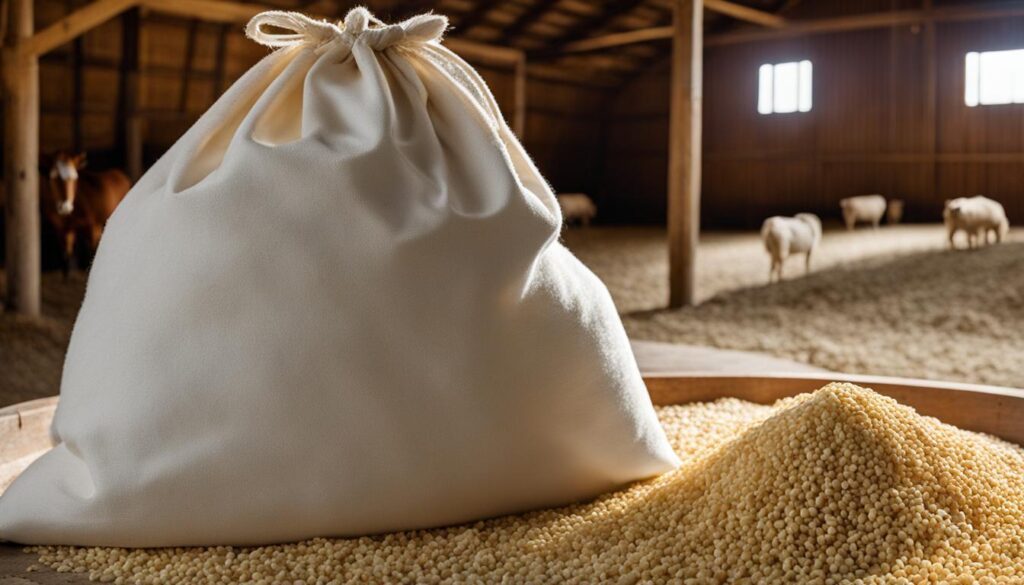As a journalist, I strive to bring you the latest and most valuable information on health and wellness. In this article, I will delve into the fascinating world of calcium phosphate and its numerous benefits for our health. Calcium phosphate has long been recognized for its crucial role in supporting bone health, but its advantages extend far beyond that. By understanding the specific applications and uses of calcium phosphate, we can harness its power to enhance our well-being.
Key Takeaways:
- Calcium phosphate is essential for reducing the risk of phosphorous deficiency in osteoporosis patients.
- Calcium phosphate offers improved solubility, stability, and bioavailability in tablet production.
- Using calcium phosphates in tablet production provides compressibility, flowability, and binding properties.
- Different types of calcium phosphates have specific applications in various industries.
- Monocalcium phosphate plays a vital role in baking, food additives, fertilizers, animal feed, and more.
The Role of Calcium Phosphate in Tablet Production

Calcium phosphates play a crucial role in tablet production, offering a range of benefits and advantages. These exceptional compounds are known for their improved solubility, enhanced stability, and increased bioavailability, making them highly desirable for formulating tablets.
One of the key functions of calcium phosphates in tablet production is acting as fillers. They provide the necessary bulk for tablet formation, ensuring that the tablets have the appropriate size and weight. Additionally, calcium phosphates contribute to the structural integrity of the tablets, preventing them from crumbling or breaking.
Another important role that calcium phosphates serve is acting as binders. They hold the tablet ingredients together, providing cohesion and ensuring that the tablets maintain their shape and integrity. This is essential for the successful production of high-quality tablets.
Moreover, calcium phosphates can also function as disintegrants. This property allows for the rapid dissolution and absorption of the active ingredients in the tablets, promoting their effectiveness. The quick disintegration of tablets is crucial for optimal drug delivery and patient compliance.
Overall, the advantages of using calcium phosphates in tablet production are manifold. Their exceptional properties make them ideal for formulating tablets with consistent weight, size, and hardness. They are also biocompatible and biodegradable, ensuring the safety and compatibility of tablets with the human body.
Combining different forms of calcium phosphates in tablet production can offer even more advantages. For example, utilizing a combination of dicalcium phosphate and tricalcium phosphate can provide improved compressibility and flowability, resulting in efficient tablet manufacturing processes.
Calcium phosphates play a vital role in tablet production, providing improved solubility, enhanced stability, and increased bioavailability. Their functions as fillers, binders, and disintegrants contribute to the production of high-quality tablets.
Advantages of Using Calcium Phosphates in Tablet Production

Using calcium phosphates in tablet production offers significant advantages. These compounds provide exceptional compressibility, allowing for the efficient molding of tablets without compromising their structural integrity. Calcium phosphates also possess excellent flowability properties, ensuring the even distribution of active pharmaceutical ingredients during manufacturing.
Moreover, calcium phosphates exhibit outstanding binding properties, providing cohesion and strength to tablet formulations. They are compatible with various active ingredients, offering versatility in formulating tablets with precise control over nutrient release.
Furthermore, calcium phosphates are highly bioavailable and biocompatible, making them suitable for pharmaceutical and nutritional applications. Their bioavailability ensures that the body can efficiently absorb and utilize the calcium and phosphorus present in the tablets. Additionally, the biocompatibility of calcium phosphates ensures that they are well-tolerated by the human body, minimizing the likelihood of adverse reactions.
Overall, the advantages of using calcium phosphates in tablet production include:
- Excellent compressibility for efficient molding
- Superior flowability for even distribution of active ingredients
- Exceptional binding properties for cohesion and strength
- Compatibility with various active ingredients for precise formulation
- Bioavailability to promote effective nutrient absorption
- Biocompatibility for reduced risk of adverse reactions
These advantages contribute to the production of high-quality tablets that deliver the desired therapeutic effects to patients.
Different Types of Calcium Phosphates and Their Specific Applications

In the world of calcium phosphates, there are various types each with its own set of applications. Let’s take a closer look at these different types:
Dicalcium phosphate (DCP)
DCP is commonly used as a filler and binder in pharmaceutical tablets. Its versatile properties make it an ideal choice for maintaining tablet integrity and ensuring consistent dosage.
Tricalcium phosphate (TCP)
TCP serves as a source of calcium in pharmaceutical formulations, promoting bone health and providing the necessary nutrients for overall well-being. It is also used as a diluent in oral solid dosage forms.
Hydroxyapatite (HAP)
HAP finds its application in regenerative medicine and serves as a bone graft substitute. Its unique composition makes it an excellent choice for supporting bone growth and regeneration.
Calcium phosphate dibasic anhydrous (DCPA)
DCPA acts as an acid-neutralizing agent in antacid tablets, providing relief from indigestion and heartburn. Its fast-acting properties make it an effective solution for gastrointestinal discomfort.
Calcium phosphate tribasic (TCP)
TCP is commonly used as a nutrient source in plant fertilizers, supporting healthy plant growth and facilitating efficient nutrient absorption. It ensures proper nutrition for optimal crop yields.
These various types of calcium phosphates play critical roles in different industries, including healthcare, agriculture, and nutrition. Their diverse applications showcase the versatility and benefits of incorporating calcium phosphates into various products and processes.
Understanding Monocalcium Phosphate Production

Monocalcium phosphate is a versatile compound that is synthesized from calcium hydroxide and phosphoric acid through a controlled reaction. The resulting product undergoes purification, drying, and powdering to ensure its suitability for various industries.
This process requires precise control and adherence to safety protocols to ensure the production of monocalcium phosphate of high purity and quality. The final product can be used in a range of applications across different sectors.
“Monocalcium phosphate production involves a controlled reaction between calcium hydroxide and phosphoric acid. The resulting compound is then further processed to create a versatile product with various uses.”
One of the common applications of monocalcium phosphate is as a leavening agent in baking. When used in baking recipes, it reacts with the baking soda and liquid present in the dough or batter, resulting in the production of carbon dioxide gas. This gas causes the mixture to rise during baking, giving the baked goods a light and fluffy texture.
In addition to baking, monocalcium phosphate is widely used as a food additive, fertilizer, and animal feed due to its high phosphorus content. In the food industry, it acts as a pH adjuster, food fortifier, and a retarder in canned fruits and vegetables.
The Multiple Uses of Monocalcium Phosphate
Here is a breakdown of the various applications of monocalcium phosphate:
| Application | Use |
|---|---|
| Baking | Leavening agent in baked goods |
| Food Industry | Food additive for texture and flavor enhancement |
| Agriculture | Fertilizer for soil pH adjustment and plant nutrition |
| Animal Feed | High phosphorus content for livestock nutrition |
These multiple applications demonstrate the versatility of monocalcium phosphate and its importance in various industries.
When handling monocalcium phosphate, it is crucial to follow safety guidelines and procedures as outlined in the Material Safety Data Sheet (MSDS). Adhering to proper handling practices ensures the safe utilization of monocalcium phosphate.
The Role of Monocalcium Phosphate in Baking

When it comes to baking, monocalcium phosphate plays a crucial role as a leavening agent. This key ingredient is responsible for achieving the light, fluffy texture and beautiful rise in baked goods.
In the process of baking, monocalcium phosphate works its magic by reacting with baking soda and a liquid. This reaction produces carbon dioxide gas, which creates the desired airy texture in the dough or batter.
When the baked goods go into the oven, the carbon dioxide gas expands, causing the mixture to rise. This rise results in those delightful, perfectly fluffy pastries, cakes, and breads that we all enjoy.
Commercial baking powders often contain monocalcium phosphate due to its exceptional leavening properties. Its use in the baking industry has significantly improved the quality and consistency of various baked goods, providing quick and predictable results.
From light and spongy cakes to tender and flaky pastries, monocalcium phosphate has become an essential ingredient in many kitchens and bakeries.
If you’re curious about how this leavening agent works, think of it as the secret to achieving baking perfection. With monocalcium phosphate, you can elevate your baking creations to new heights.
“Monocalcium phosphate is the catalyst that transforms a mere mixture of ingredients into a heavenly creation, giving bakers the power to produce tender delights and awe-inspiring desserts.” – [Insert Relevant Expert Quote]
The Impact of Monocalcium Phosphate
To fully understand the significance of monocalcium phosphate in baking, let’s take a closer look at how it contributes to different types of baked goods:
| Baked Good | Role of Monocalcium Phosphate |
|---|---|
| Cakes | Facilitates a light, fluffy texture and helps the cake rise evenly. |
| Pastries | Creates a tender and flaky texture, adding layers of indulgence. |
| Breads | Provides a soft and airy crumb, making each slice a delight to savor. |
| Muffins | Delivers a moist and tender crumb, enhancing their overall appeal. |
As you can see, monocalcium phosphate elevates the quality of baked goods across various categories. Its consistent performance and reliable results have made it a staple in the world of baking.
So, the next time you’re whipping up a batch of cookies or preparing a show-stopping cake, remember to give credit to monocalcium phosphate for its vital role in creating those delectable treats.
Monocalcium Phosphate as a Food Additive
Monocalcium phosphate is a versatile food additive that offers various benefits to the food industry. Its usage extends from enhancing texture and flavor to controlling pH balance and serving as a retarder, making it an invaluable ingredient in countless food products.
“Monocalcium phosphate enhances the texture and flavor of food products, acting as a leavening agent in baking, controlling pH balance in cheese and dairy products, and serving as a retarder in canned fruits and vegetables.”
One of the primary uses of monocalcium phosphate is as a leavening agent in baking. When combined with baking soda and a liquid, it undergoes a chemical reaction that produces carbon dioxide gas. This gas expands during baking, resulting in the rising of dough or batter and creating a light and fluffy texture in baked goods.
Furthermore, monocalcium phosphate plays a vital role in controlling pH balance in cheese and dairy products. It helps regulate acidity levels and prevents spoilage, ensuring the quality and shelf life of these perishable items.
Additionally, monocalcium phosphate acts as a retarder in canned fruits and vegetables, preventing discoloration and maintaining the freshness and visual appeal of these products.
Moreover, monocalcium phosphate serves as a significant source of essential minerals like calcium and phosphorus. These minerals contribute to overall nutrition and the maintenance of healthy bones and teeth.
To sum up, monocalcium phosphate is a highly versatile food additive, enhancing the texture, flavor, and quality of various food products. Its uses range from acting as a leavening agent in baking to regulating pH balance in cheese and dairy products and serving as a retarder in canned fruits and vegetables. Additionally, monocalcium phosphate provides essential minerals, further contributing to the nutritional value of food products.
Benefits of Monocalcium Phosphate as a Supplement
Monocalcium phosphate supplements offer a range of potential health benefits, particularly in supporting bone health and reducing the risk of osteoporosis. These supplements provide a convenient and effective way to increase calcium intake and support overall health. However, it is important to note that monocalcium phosphate supplements should not be used as a substitute for a healthy, balanced diet.
Monocalcium phosphate contains calcium, which is essential for maintaining strong bones and preventing bone loss. It plays a vital role in promoting bone mineralization and density, reducing the risk of fractures and osteoporosis, especially in postmenopausal women who are more susceptible to bone loss. By supplementing with monocalcium phosphate, individuals can ensure they are meeting their recommended daily calcium intake and supporting optimal bone health.
Moreover, monocalcium phosphate supplements provide an easily absorbable form of calcium that is readily available for the body to utilize. This ensures maximum bioavailability and effectiveness compared to other calcium sources. Additionally, monocalcium phosphate supplements may also contain phosphorus, another vital mineral necessary for bone health.
However, it is crucial to consult with a healthcare professional before starting any new supplement regimen, including monocalcium phosphate supplements. They can provide personalized guidance based on individual health needs, ensure there are no contraindications or interactions with medications, and help determine the appropriate dosage for optimal benefits. It is also essential to follow the recommended dosage instructions provided by the supplement manufacturer.
While monocalcium phosphate supplements can be a valuable addition to a well-rounded approach to bone health, they should be used as part of a comprehensive strategy that includes a balanced diet, regular exercise, and a healthy lifestyle. A varied and nutrient-rich diet, which includes calcium-rich foods like dairy products, leafy greens, and fortified foods, should be the primary source of essential nutrients for optimal health.
Overall, monocalcium phosphate supplements offer a convenient and effective way to support bone health and meet calcium requirements. When used in conjunction with a healthy lifestyle, they can contribute to overall well-being and reduce the risk of osteoporosis.
Monocalcium Phosphate in Fertilizers
Monocalcium phosphate is a valuable ingredient in the production of fertilizers, playing a crucial role in soil pH adjustment and plant nutrition in the agricultural industry. These fertilizers contain monocalcium phosphate, which is water-soluble and rich in essential nutrients like phosphorus and calcium. When applied in appropriate quantities, fertilizers containing monocalcium phosphate support crop growth and increase yields, contributing to overall agricultural productivity.
One of the key applications of monocalcium phosphate in fertilizers is its ability to influence soil pH. As a phosphate-based fertilizer, monocalcium phosphate helps neutralize acidic soils by increasing their pH levels, creating a more favorable environment for plant growth. By optimizing pH levels, monocalcium phosphate fertilizers enhance nutrient uptake and promote healthy root development, enabling crops to reach their full potential.
In addition to influencing soil pH, monocalcium phosphate fertilizers provide essential nutrients for plant growth. Phosphorus is a vital element required for various metabolic processes in plants, such as energy transfer, root development, and flowering. Calcium, on the other hand, plays a crucial role in cell structure and function, contributing to overall plant health and growth.
When used in appropriate amounts and in conjunction with other essential nutrients, monocalcium phosphate fertilizers can significantly improve crop yields, ensuring the optimal growth and development of agricultural crops. However, it is essential to follow best practices and consideration for potential environmental impacts when using fertilizers containing monocalcium phosphate, as excessive application can lead to nutrient runoff and pollution of water bodies.
Overall, the incorporation of monocalcium phosphate in fertilizers offers a valuable solution for farmers and agricultural professionals looking to enhance soil fertility, optimize nutrient availability, and maximize crop productivity. By providing essential nutrients and influencing soil pH levels, monocalcium phosphate fertilizers contribute to sustainable agricultural practices and support the global food supply.
Monocalcium Phosphate in Animal Feed

Monocalcium phosphate is a crucial ingredient in animal feed, providing essential nutrients for the health and growth of livestock. With its high phosphorus content, monocalcium phosphate plays a vital role in supporting bone development, energy utilization, and DNA synthesis in animals.
Phosphorus is a key mineral that contributes to the overall well-being of livestock. It is essential for maintaining strong bones, ensuring proper metabolism, and supporting various physiological functions. Monocalcium phosphate provides a concentrated source of phosphorus, making it an invaluable addition to animal feed formulations.
This easily digestible nutrient is typically added to feed blends in the form of granules or powder. Its convenient form allows for efficient blending and integration into feed rations, ensuring that animals receive optimal phosphorus levels in their diet.
However, it is important to note that excessive intake of phosphorus can have adverse effects on animal health. Overconsumption can lead to mineral imbalances, contributing to conditions such as metabolic disorders, urinary calculi, and reduced feed efficiency. Therefore, proper dosing and monitoring of monocalcium phosphate in animal feed is essential to maintain the optimal nutritional balance for livestock.
Optimizing the phosphorus levels in animal feed through the inclusion of monocalcium phosphate can have several benefits for livestock production:
- Promotes bone health and development
- Supports efficient energy utilization
- Aids in DNA synthesis and cellular functions
- Enhances overall reproductive performance
- Improves feed conversion and growth rates
By incorporating monocalcium phosphate into animal feed, producers can ensure their livestock receive the necessary nutrients for optimal health and performance.
| Benefits of Monocalcium Phosphate in Animal Feed | Benefits |
|---|---|
| Promotes bone health and development | Supports the formation and maintenance of strong bones in livestock |
| Enhances energy utilization | Facilitates efficient energy metabolism in animals |
| Aids in DNA synthesis | Supports cellular functions and contributes to overall growth and development |
| Improves reproductive performance | Enhances fertility and reproductive success in livestock |
| Enhances feed conversion and growth rates | Optimizes nutrient utilization, leading to improved feed conversion efficiency and faster growth |
Proper inclusion of monocalcium phosphate in animal feed formulations can contribute to the overall health, well-being, and productivity of livestock. However, it is crucial to consider the specific nutritional requirements of each animal species and consult with a veterinarian or nutritionist to establish appropriate feed formulations.
Safety and Handling of Monocalcium Phosphate

When working with monocalcium phosphate, it is crucial to prioritize safety and adhere to proper handling procedures. Taking the necessary precautions ensures the well-being of workers and prevents any harm to the environment. To ensure safe practices, refer to the Material Safety Data Sheet (MSDS) for detailed guidance on handling and storage.
Responsible handling and storage are essential when working with any substance, including monocalcium phosphate. By following the recommended procedures, you can prevent accidents and avoid any potential contamination.
Conclusion
Calcium phosphate is a versatile ingredient with a wide range of benefits in multiple industries. Whether it’s promoting bone health in healthcare, enhancing food texture in the food production industry, supporting plant growth in agriculture, or providing essential nutrients in animal feed, calcium phosphate plays a vital role. Understanding the various uses and advantages of calcium phosphate allows for its optimal utilization across different sectors, contributing to overall health and well-being.
One of the key benefits of calcium phosphate lies in its ability to promote bone health. With osteoporosis affecting millions of individuals, it is crucial to ensure adequate calcium and phosphorus intake. Calcium phosphate supplements, especially for postmenopausal women at risk of bone loss, can help merge calcium into bone and prevent phosphorus deficiency.
Moreover, calcium phosphate offers advantages in tablet production, such as improved solubility and stability, enhanced bioavailability, and the ability to act as a filler, binder, and disintegrant. Additionally, different types of calcium phosphates serve specific applications in various industries, including healthcare, agriculture, and nutrition.
In conclusion, calcium phosphate is a valuable ingredient that provides numerous benefits in different sectors. Its role in supporting bone health, promoting plant growth, enhancing food texture, and providing essential nutrients cannot be overstated. By understanding its benefits and applications, we can make the most of calcium phosphate’s potential and contribute to the improved health and well-being of individuals and communities.
FAQ
What are the benefits of calcium phosphate for health?
Calcium phosphate offers several health benefits, including promoting strong bones and teeth, supporting nerve and muscle function, aiding in blood clotting, and maintaining a healthy pH balance in the body.
How does calcium phosphate play a role in tablet production?
Calcium phosphates are widely recognized for their exceptional properties in tablet production. They act as fillers, binders, and disintegrants, providing bulk, cohesion, and rapid dissolution of tablets. Their properties ensure consistent weight, size, hardness, and bioavailability of the tablets.
What are the advantages of using calcium phosphates in tablet production?
Using calcium phosphates in tablet production provides advantages such as improved compressibility, flowability, binding properties, compatibility with active ingredients, precise nutrient release control, and biocompatibility. These advantages contribute to the production of high-quality tablets.
What are the different types of calcium phosphates and their specific applications?
There are several types of calcium phosphates with different applications. Dicalcium phosphate (DCP) is commonly used as a filler and binder in pharmaceutical tablets, while tricalcium phosphate (TCP) is used as a source of calcium and a diluent in oral solid dosage forms. Hydroxyapatite (HAP) is used in regenerative medicine and as a bone graft substitute, and calcium phosphate dibasic anhydrous (DCPA) is used as an acid-neutralizing agent in antacid tablets. Calcium phosphate tribasic (TCP) is used as a nutrient source in plant fertilizers.
How is monocalcium phosphate produced and what are its uses?
Monocalcium phosphate is synthesized from calcium hydroxide and phosphoric acid through a controlled reaction. It is commonly used as a leavening agent in baking, a food additive to enhance texture and control pH balance, a soil fertilizer for pH adjustment and plant nutrition, and an essential phosphorus source in animal feed.
What role does monocalcium phosphate play in baking?
Monocalcium phosphate serves as a leavening agent in baking. It reacts with baking soda and a liquid to produce carbon dioxide gas, resulting in the rise of dough or batter and a light, fluffy texture in baked goods.
How is monocalcium phosphate used as a food additive?
Monocalcium phosphate is used as a food additive to enhance texture, control pH balance in cheese and dairy products, and act as a retarder in canned fruits and vegetables. It also provides a source of essential minerals like calcium and phosphorus in food products.
What are the benefits of monocalcium phosphate as a supplement?
Monocalcium phosphate supplements can support bone health and reduce the risk of osteoporosis by increasing calcium intake. However, they should not replace a healthy, balanced diet, and it is important to consult with a healthcare professional before starting any new supplement regimen.
How is monocalcium phosphate used in fertilizers?
Monocalcium phosphate is used in fertilizers for soil pH adjustment and plant nutrition. It is water-soluble and provides essential nutrients like phosphorus and calcium, supporting crop growth and increasing yields.
What is the role of monocalcium phosphate in animal feed?
Monocalcium phosphate is added to animal feed as a source of phosphorus, which supports bone development, energy utilization, and DNA synthesis in animals. However, proper dosing and monitoring are important to prevent excessive phosphorus intake.
What safety considerations should be followed when handling monocalcium phosphate?
Proper safety precautions and handling procedures should be followed to ensure the health and safety of workers and the environment when working with monocalcium phosphate. Guidelines can be found in the Material Safety Data Sheet (MSDS).
What are some of the main benefits of calcium phosphate?
Calcium phosphate offers numerous benefits in various industries, including promoting bone health, supporting plant growth, enhancing food texture and flavor, providing essential nutrients, and ensuring the safety and compatibility of tablets and supplements.
Source Links
- https://www.nutraingredients.com/Article/2002/06/03/Calcium-supplements-should-contain-phosphorous-too-says-study
- https://www.linkedin.com/pulse/unlock-potential-calcium-phosphates-canberra-offers-silvia-andrea?trk=article-ssr-frontend-pulse_more-articles_related-content-card
- https://www.capecrystalbrands.com/blogs/cape-crystal-brands/what-is-monocalcium-phosphate-exploring-its-uses-and-benefits






